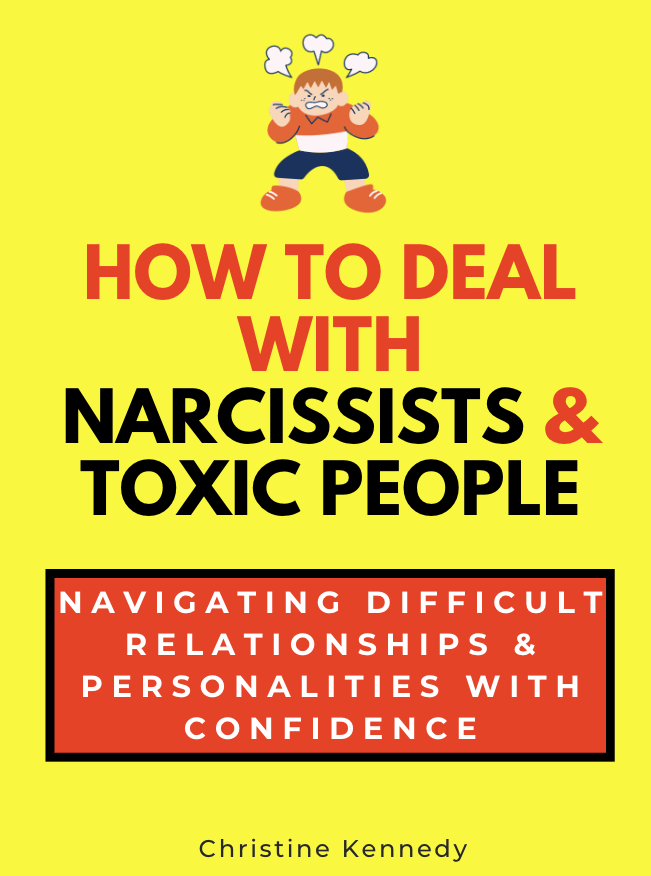Navigating relationships, especially those tainted by narcissism and toxicity, can be incredibly challenging.
Christine Kennedy’s book, How to Deal With Narcissists & Toxic People – Navigating Difficult Relationships & Personalities with Confidence, provides a valuable resource for those struggling in such circumstances.
With a blend of empathy, practical advice, and psychological insight, Kennedy equips readers with the tools needed to recognize, manage, and ultimately overcome the detrimental effects of toxic relationships.
Table of Contents
Understanding Narcissism and Toxicity
One of the book’s greatest strengths is its approach to understanding narcissism and toxic behavior. Kennedy goes into the psychology of narcissism, explaining its various manifestations, from overt grandiosity to covert manipulation. The book elucidates the root causes of narcissistic behavior, tracing them back to childhood experiences and psychological profiles. By understanding these underpinnings, readers can better recognize the signs of narcissistic behavior in their relationships.
Impact on Mental Health
Kennedy does not shy away from discussing the profound emotional and mental health consequences of toxic relationships. She describes how constant manipulation, gaslighting, and emotional abuse can erode self-esteem, leading to anxiety, depression, and a distorted sense of self-worth. This section is particularly poignant, as it validates the experiences of those who have suffered under the influence of a narcissist. Kennedy’s empathetic tone reassures readers that their feelings are legitimate and that they are not alone in their struggles.
Building Boundaries and Resilience
A significant portion of the book is dedicated to empowering readers to set and enforce healthy boundaries. Kennedy provides clear, actionable advice on how to establish firm limits with narcissists and toxic individuals. She emphasizes the importance of maintaining these boundaries consistently, despite the likely resistance and manipulation attempts. The book offers practical communication strategies, such as the use of “I” statements and the Gray Rock Method, which are designed to minimize conflict and protect one’s emotional well-being.
The chapters on building emotional resilience are particularly empowering. Kennedy encourages readers to develop coping mechanisms, practice self-care, and cultivate mental strength. These strategies are essential for anyone looking to reclaim their life from the grips of a toxic relationship. The book underscores the importance of self-compassion and self-forgiveness, offering techniques for overcoming guilt and self-blame, which are common among survivors of narcissistic abuse.
Navigating Complex Situations
Kennedy also addresses more nuanced scenarios that are often overlooked in other self-help books. She provides guidance on co-parenting with a narcissistic ex-partner, managing toxic family dynamics, and dealing with narcissistic behavior in the workplace. These sections are invaluable, as they offer tailored advice for maintaining one’s well-being in situations where complete avoidance of the toxic individual is not possible.
Holistic and Practical Approach
What sets this book apart is its holistic and practical approach. Kennedy doesn’t just offer theoretical knowledge; she provides concrete steps that readers can implement immediately. The book is filled with practical tips and relatable scenarios that make the advice accessible and actionable. Additionally, Kennedy emphasizes the importance of building a support network and seeking professional help when necessary, reinforcing that healing is a process that often requires external support.
Some of the information is repetitive, but it also isn’t totally out of place in a book where some readers may choose to read the chapters or parts most relevant to their circumstances.
Final Thoughts
How to Deal With Narcissists & Toxic People by Christine Kennedy is a must-read for anyone trapped in the web of a toxic relationship. Its blend of psychological insight, practical advice, and empathetic understanding makes it an invaluable resource. Kennedy’s compassionate yet empowering approach guides readers on a journey of self-discovery, resilience, and healing. By the end of the book, readers will not only understand the dynamics of narcissistic behavior but will also feel equipped and empowered to reclaim their lives and build healthier, more fulfilling relationships.
This book is not just about surviving narcissistic abuse; it’s about thriving in its aftermath. For those seeking to break free from the cycle of toxicity and embark on a path to self-recovery, Kennedy’s guide is a great companion.
Overall, a wealth of information on understanding narcissism and how to deal with toxic people to reclaim your life and happiness.
Rating: 4.8/5


